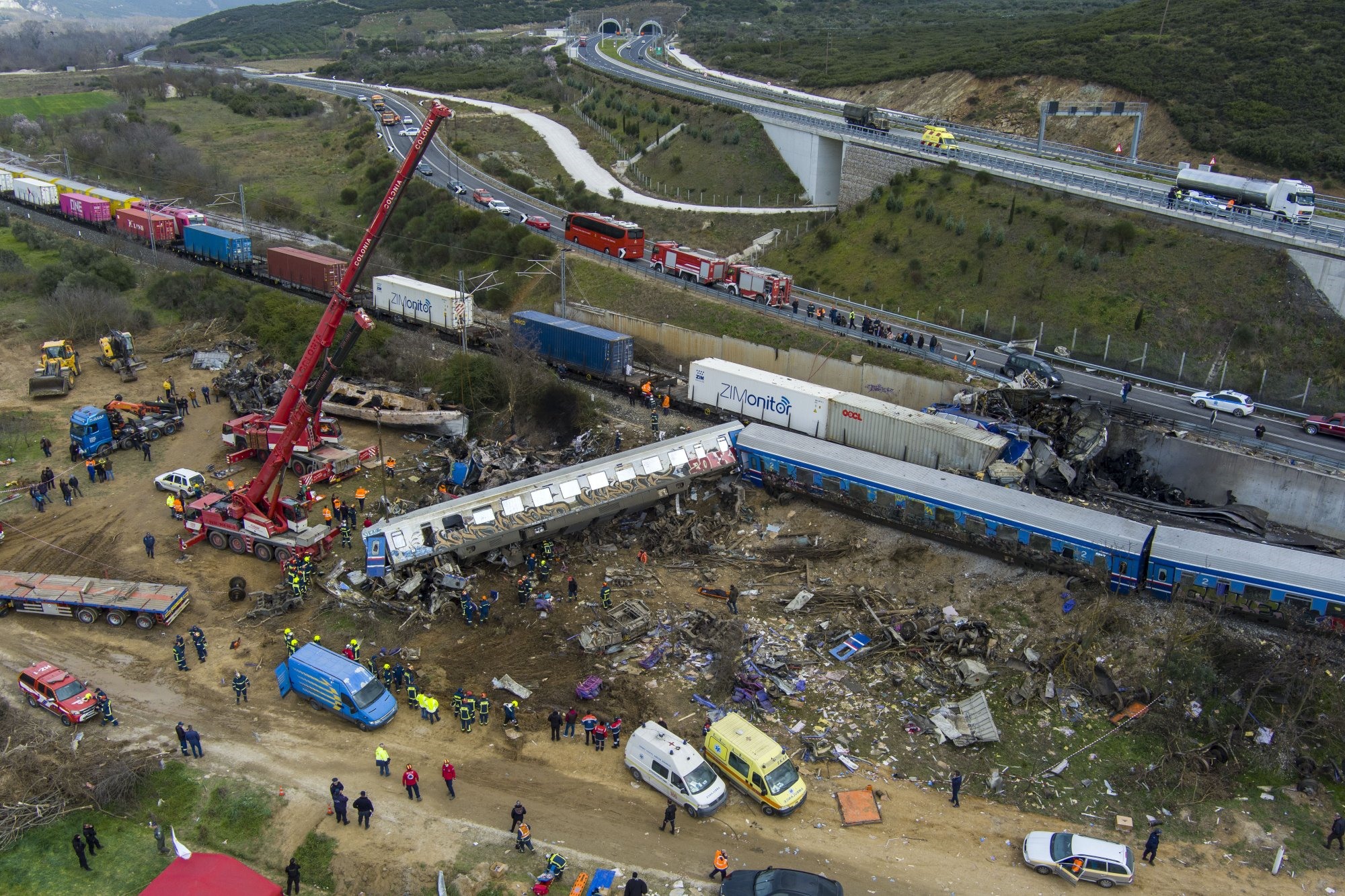The wounds from the Tempi rail disaster remain open following new revelations about the manipulation of recordings of the stationmaster’s spoken exchanges leaked just hours after the tragedy
It is often said that publishing a piece of writing means abandoning it to its readers. Because, inevitably, every one of them will read a little of what they want into it, a little of what they don’t want, and a little of what they fear. It works like a recipe, or chemistry: the amount of each in the mixture will determine the reaction.
This was the case with the report published in To Vima the day before yesterday, entitled “Tempi tampering casts new shadows over the tragedy”. No sooner had we sent it out into the world than it acquired a life of its own through a range of interpretations that paid little heed to either the truth or the words on the page. But the words are there for all to see, and they mean what they mean. And we have to defend them. After all, where would us writers be without them?
Still, one thing is clear: we’re not in the business of politics or communication. Our language may be more prosaic, less flashy than messages that have been carefully spun to sit well with the public. But it is also more honest.
What the article claims
So let’s take a look at what we wrote, in our own words, not those of the party announcements.
– At noon on 1 March 2023, just a few hours after the crime at Tempi, a manipulated verbal exchange was released which “sought to irrefutably prove that the stationmaster had made a sequence of incorrect orders”.
– Specifically, we wrote: “As revealed by the latest documents released by the Hellenic Police’s Forensic Laboratories and presented by our newspaper, the stationmaster’s affirmation that a train could depart along the ‘wrong route’ did not actually relate to the ill-fated train, as it appeared to do in an edited audio document. The stationmaster was actually telling the driver of a local train traveling on the right route that they could depart the station”.
– To Vima made it crystal clear that it was the recording that was made public, not the recordings that form part of the case file, that were manipulated. The former are all about spin; about the image an audio clip which—to quote our article, revealed “the care taken to promote the theory of actual human error and that alone”—would imprint on public opinion.
– The complete and unadulterated recordings copied from the OSE recording system were given to the Greek Police in the context of their preliminary investigation two days after the release of the manipulated version. This is exactly the gap identified in the To Vima article and backed up by documents that testify to the recordings’ receipt by the Forensic Laboratories of the Hellenic Police.
– Naturally, this leads us to ask who had access to the OSE recording system, so that they might copy the audio files, edit them, and leak them to the public.
– As for the origin of the audio files, the article identified a major contradiction. When addressing the parliamentary committee of inquiry, a senior OSE official said he called the police a few hours after the accident and went “with an authorized person” to take the recordings from the OSE premises where they were kept. He noted that “to do so, the person has to have authorization from the OSE, enter with a code and copy the files onto a USB stick. A record is kept of everyone who enters and which files they copy.”
– However, the above statement appears to be completely contradicted by sources within the Hellenic Police. Speaking to To Vima, officers stressed that they did not receive the recorded exchanges in the manner described on March 1. And that the recordings were actually delivered to police headquarters at a later time (at 2 p.m. on March 3, 2023) by an OSE employee. In fact, as the document published as an exclusive by To Vima reveals, the recordings in question were delivered by an employee with the initials N.K., who works in the OSE’s Electromechanical Systems and Electrification Maintenance Department.
What ND, SYRIZA and PASOK read into the article
But let’s see what the three main Greek political parties wrote and said about the above.
– That two separate exchanges were spliced together is not disputed by anyone. Indeed, despite its vociferous reactions, the government did not actually call into question the accuracy of the information that forms the core of our reportage, though this did not stop it from paradoxically labeling our piece “fake news.” The government spokesman said that the publication of the doctored dialog was so well known that “a number of media outlets, including the public broadcaster ERT and the website of the same group, have been referring to it since March 2, 2023.” What the government’s announcements fail to mention, however, is what action it has taken to shed light on this well-known incident, even though it is clear that accessing, falsifying and publicizing these recordings is illegal.
– Nea Dimokratia (New Democracy) referred to a “misleading title” in its statement. But what could be misleading about the headline “Tempi tampering casts new shadows over the tragedy,” given that they insist the editing was known to all and thus admitted. Who performed the manipulation is a mystery, hence “shadow.”
– The president of SYRIZA, Stefanos Kasselakis, noted yesterday in a statement of his own that To Vima revealed “state editing” and that “the state / parastate gave the manipulated material to pro-government media to create the impression among the public that the accident was caused by a random instance of human error.” Similarly, in the light of the publication, PASOK president Nikos Androulakis announced his intent to file a motion of no-confidence, referring to “a ruthless pack of hounds in power who violate human rights and are undermining the Rule of Law.” However, To Vima neither named the guilty parties nor hinted at or indicated who they might be. The parties’ statements reflect their own conclusions and aspirations.
What questions remain unanswered
Which brings us back to the real and unanswered questions. As we noted at the very start of our article:
“To begin with, we need to know: How were the audio files containing the exchanges between the stationmaster and train drivers retrieved and made public (having already been electronically edited) just a few hours after the fatal train crash? The critical question here is: Who removed these recordings from the OSE’s password-controlled recording system with such haste? And with the obvious primary intention of focusing public interest on individual railway workers rather than on the absence of electronic safety systems. It is noted that the records show these files as having been officially handed over to the Hellenic Police and judicial authorities on 3 March 2023; no one outside the OSE should have had access to them until that date.”
These, word for word, are the questions we posed to the competent Greek authorities. We made no accusations, nor did we incriminate anyone, because—above all else—that is not our role. So why this reaction?
But we will persist with our questions. Because we have to: that is our role. And in this respect, things are fortunately very clear.



